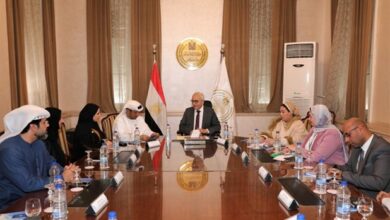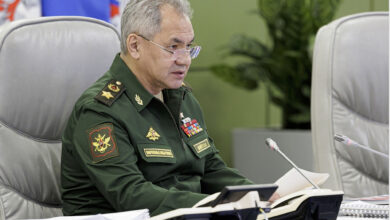The beginning of the academic year this week was inaugurated with a host of strikes by employees across sectors — public bus drivers, teachers and administrative educational employees, university workers, students and industrial workers.
Violent dispersals, arrests and harassment have cost President Mohamed Morsy and Prime Minister Hesham Qandil some criticism for holding their stick hard against the labor movement.
This crackdown poses a dilemma. Questions are increasing regarding what the new regime can do with ongoing labor unrest, empty coffers and the inability to respond by granting some economic concessions, as per official statements. For some, the alternative is to grant political and organizational concessions. But that strategy remains unclear.
Denouncements from both ends
An independent group called the Popular Front for a Civil State issued a statement calling on authorities to hold security forces accountable for “forcibly breaking up a sit-in occupation at Nile University while threatening and terrorizing striking [Public Transport Authority] workers.” A number of human rights NGOs have issued similar statements.
Independent workers’ organizations including the Egyptian Democratic Labor Congress and the Egyptian Federation of Independent Trade Unions have also issued statements denouncing the crackdowns.
The trade union federation’s online statement, declared: “The government of Hesham Qandil and presidency of Mohamed Morsy have clearly displayed their enmity toward labor,” adding this was exemplified in “the arrest of striking workers and assaults on female workers at the hands of security services.”
The labor congress mentions that the state “has returned to its old habits.” The statement denounces “the referral of tens of striking teachers to disciplinary hearings and investigations” along with “the riot police’s siege of striking PTA workers in their garages” and the “arrest of a PTA strike leader.” This statement also decries the “police attack” on tree-planting workers protesting at the Agriculture Ministry in Giza, which led to injuries for both male and female workers and seven arrests.
The state-owned media denounced the partial strikes led by PTA workers and teachers as “failed” strikes that harm the country’s economy, transportation and education. State newspapers have criticized strikers’ demands as being “unrealistic” or “unfeasible.” The state-controlled media has reiterated the regime’s inability to meet demands in light of depleted public coffers.
Members of the ruling Freedom and Justice Party — the Muslim Brotherhood’s political arm — have also openly denounced industrial actions. Several weeks ago, Hassan al-Brince, a former MP and leading figure in the FJP, declared that workers’ protests and sit-ins outside the presidential palace are being organized by counter-revolutionary forces that aim to topple Morsy, giving the impression that he is unable to resolve their problems.
In an interview this week with a state-owned paper, Sabry Amer — an FJP parliamentarian and former chairman of the People’s Assembly Transportation and Telecommunications Committee — stated that PTA workers were committing “an act of treason” by striking and halting public transport.
Public transportation workers
PTA workers launched a partial strike on 15 September, the first day of school. They announced they would escalate this into a comprehensive strike the following day, involving all 27 garages across greater Cairo. PTA workers have launched numerous strikes demanding they be made part of the Transportation Ministry rather than Cairo Governorate.
However, the strike, called for by the Independent Union of PTA workers, did not spill over into all the other garages, as had been announced. Some workers affiliated with the state-controlled General Union of Land Transport Workers did not heed the call.
On 16 September, hundreds of Central Security Forces troops were deployed outside the Mazallat and Imbaba garages, which were at the heart of the strike. These riot police forces stormed the Imbaba Garage and arrested Tareq al-Beheiry, an organizer and spokesperson for the independent PTA union. His arrest led to the PTA strike wave spreading from two garages to nine the following day. Pending investigations by the public prosecutor, Beheiry was jailed for nearly three days before being released on 18 September.
Bus driver and strike leader Ali Fattouh says five garages were on total strike while 22 others were operating at 30 percent capacity, and about 7,000 to 8,000 workers out of 45,000 are now on strike.
“Beheiry was arrested and had trumped-up charges leveled against him because he is an independent unionist, our union’s official spokesman and a brave strike leader. It was a threat and a message directed against all us strikers. It was an attempt to intimidate us into calling off our strike,” says Fattouh.
Beheiry’s lawyer, Malek Adly, who works at the Egyptian Center for Economic and Social Rights, points out that “the strike is a right, not a crime.”
“The labor policies of Morsy and Qandil are even fouler than those of [former President Hosni Mubarak,” Adly says, explaining that Beheiry was the PTA workers’ chief negotiator with the Manpower Ministry. “PTA officials presented the police and prosecutors with falsified charges against this independent unionist, which is why he was arrested and interrogated. Even the Mubarak regime didn’t resort to such lowly tactics against independent union organizers.”
The Brotherhood is in the process of scrapping the Trade Union Liberties Draft Law, which was prepared under former Manpower Minister Ahmed Hassan al-Borai, the labor lawyer explains. The new minister, Khaled al-Azhary, is “working on a new trade union law prepared exclusively by the Brotherhood,” he says.
“The new regime is not presenting workers with social or economic rights, nor political or organizational rights. The regime is increasingly responding to strikes by security crackdowns,” Adly adds.
Fattouh says PTA workers embarked on strikes in 2007, 2009, 2010 and 2011 — during Mubarak’s rule — yet “no such punitive actions” were taken against them. “We’re not asking the state for money, we’re asking for a clear stance as to where the PTA stands, under whose jurisdiction,” he says. “We demand to be administered under the Transportation Ministry or as an independent authority.”
The bus driver sees a problem affecting all sectors. “All authorities are washing their hands,” Fattouh says. “As workers, we are all facing a bleak prospect. We have no real right to organize or strike.”
Teachers and university administrators
Teachers and administrative academic employees began nationwide protests on 8 September. These protests escalated into a large sit-in outside the Cabinet building on 10 September, followed by partial strikes in schools with the beginning of the academic year on 15 September.
Teachers and administrative employees had launched a nationwide strike last year, at the same time and with the same unmet demands. These include establishing a fixed minimum wage and incremental pay raises, giving full-time contracts for full-time work, restructuring the Education Ministry and purging it of corruption, and eliminating the phenomenon of private tutoring.
While about 5,000 out of a million teachers and administrative employees are reportedly striking, the strike has not affected all governorates.
More than 20 striking teachers have been referred to disciplinary hearings and, reportedly, several might be referred to prosecutors on charges of instigation and/or “disrupting the academic year.” On the third day of the strike, police tore down teachers’ tents and dispersed their sit-in outside the Cabinet.
Nonetheless, dozens of teachers regrouped and launched a new sit-in the following day, in defiance of the police. These punitive measures have been criticized by the independent teachers’ syndicates, which organized the actions, on the basis that they deny members the right to strike or protest.
One protester from Giza, who asked to remain anonymous, says the Education Ministry “claims it respects our right to protest, but not our right to strike… We’re not protesting and striking for the sake of bringing down the educational and academic system. We’re striving to improve our conditions and our students’ educational conditions,” he says.
In response to this second academic year of strikes and protests, the Cabinet declared it had secured US$1.3 billion to increase teachers’ salaries. Yet teachers claim that these pay raises, if issued, would not be given out before November. “We’ve seen little to no change since the revolution. Morsy claims that he stands with the teachers and working classes, yet we haven’t seen this translated into reality,” the teacher says.
During the days of the Mubarak regime, officials would give them no responses to grievances — now they receive responses but no actions, according to the teacher.
“We hope that Morsy will not resort to Mubarak regime policies,” the teacher says.
This story was originally published in Egypt Independent's weekly Print Edition.




